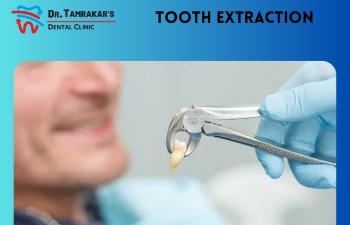Tooth extraction is a dental procedure in which a tooth is removed from its socket in the jawbone. There are various reasons why a tooth may need to be extracted, including severe decay, infection, periodontal disease, overcrowding, or trauma. Tooth extraction is typically performed by a dentist or an oral surgeon. Here is a general overview of the tooth extraction process: Examination and X-rays: The dentist will examine your tooth and take X-rays to assess its condition and the surrounding structures. Anesthesia: Before the extraction, the area around the tooth will be numbed using a local anesthetic. In some cases, you may also receive sedation to help you relax during the procedure. Extraction: The dentist will use specialized instruments to gently loosen the tooth from its socket. Depending on the tooth's condition, the dentist may need to remove it in pieces or perform a surgical extraction, which involves making an incision in the gum to access the tooth. Post-extraction care: After the tooth is extracted, you will be instructed to bite down on a piece of gauze to control bleeding. The dentist may place stitches if necessary. You will be given instructions on how to care for the extraction site, including how to clean it and what to avoid in terms of eating and drinking. Recovery: The recovery period can vary depending on the complexity of the extraction and your individual healing process. You may experience some swelling, discomfort, and mild bleeding for a few days after the procedure. The dentist may prescribe pain medication or recommend over-the-counter pain relievers to manage any discomfort. It's essential to follow the post-extraction instructions provided by your dentist to promote healing and prevent complications. Follow-up: In some cases, a follow-up appointment may be necessary to monitor your healing progress and remove any stitches if they were used. It's important to note that while tooth extraction may be necessary in certain situations, dentists usually consider it a last resort. They will typically explore other treatment options, such as fillings, root canals, or dental crowns, to preserve your natural tooth whenever possible. If you're facing the possibility of a tooth extraction, it's best to consult with a dentist who can evaluate your specific situation and recommend the most appropriate treatment.


